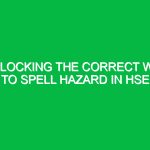Welcome and Purpose of the Toolbox Talk
Good morning, team! Today, we’re going to have an important Toolbox Talk about the Questions to Ask Before a Work Task. This discussion is crucial for ensuring that we all stay safe and aware of our surroundings while performing our daily work activities. By asking the right questions before starting any task, we can identify potential Hazards, enhance our Safety practices, and promote a culture of health and Safety in our workplace.
Understanding the Importance of Questions Before a Task
Asking the right questions before beginning a job is not just a good practice; it’s essential for maintaining a safe working Environment. When we take the time to pause and reflect on what we’re about to do, we can better prepare ourselves and our teammates for the challenges ahead. This proactive approach helps prevent accidents and injuries, ensuring that everyone goes home safe at the end of the day.
Key Aspects of Asking Questions
Let’s break down some fundamental aspects that encompass the Questions to Ask Before a Work Task. These include:
- Understanding the task at hand
- Identifying potential Hazards
- Ensuring proper Training and equipment
- Recognizing environmental factors
- Engaging teamwork and communication
1. Understanding the Task at Hand
Before diving into any task, it’s crucial to comprehend what the job entails. Ask yourself:
- What is the objective of this task?
- What steps are involved in completing it?
- What tools or equipment will I need?
For example, if you’re scheduled to operate heavy machinery, you must be clear about the operational Procedures, potential risks, and emergency protocols associated with that machinery.
2. Identifying Potential Hazards
Every task comes with its own set of risks. It’s vital to assess these hazards before starting work. Consider these questions:
- What are the potential hazards associated with this task?
- Are there any materials or chemicals involved that require special handling?
- Is there a risk of slips, trips, or falls in this area?
For instance, if you’re working at a height, are you aware of the Fall Protection measures in place? Always perform a risk assessment to spot any potential dangers before proceeding.
3. Ensuring Proper Training and Equipment
It’s essential to ensure that you and your teammates are adequately trained and equipped for the tasks assigned. Ask yourself:
- Do I have the necessary training to perform this job?
- Is my equipment in proper working condition?
- Am I wearing the appropriate Personal Protective Equipment (PPE)?
Consider a scenario where a worker is about to use a power tool. If they haven’t received proper training, the risk of accidents increases significantly. Always confirm that you are prepared and equipped before getting started.
4. Recognizing Environmental Factors
The work environment can greatly impact safety and productivity. Evaluate the surroundings by asking:
- Are there any weather conditions that could affect my work?
- Is the work area free from clutter and obstacles?
- Are there any potential distractions that could pose a risk?
For example, if it’s raining and you’re working outdoors, are the surfaces slippery? Recognizing and adjusting to environmental factors is key to maintaining safety.
5. Engaging Teamwork and Communication
Effective communication and teamwork can make a significant difference in Workplace Safety. Consider these questions:
- Have I communicated my plans with my team?
- Is everyone aware of their roles and responsibilities?
- Are there any concerns that my teammates want to address before we start?
In a recent project, a team member raised a concern about a potential hazard that others had overlooked. Their input helped the team devise a safer approach to the task, showcasing the importance of open communication.
Real-Life Examples and Scenarios
Let’s look at some real-life examples to illustrate the importance of asking these questions:
Example 1: Construction Site
At a construction site, workers were preparing to lift heavy materials using a crane. Before starting, the supervisor gathered the team to ask the following:
- Is everyone trained in crane Operation?
- Have we inspected the crane and rigging equipment?
- Are there any overhead power lines or other hazards we should be aware of?
This proactive approach not only ensured compliance with safety Regulations but also fostered a culture of safety awareness among the team.
Example 2: Chemical Handling
In a chemical processing facility, a worker was about to handle a new substance. Before proceeding, they asked:
- What are the Safety Data Sheet (SDS) details for this chemical?
- What PPE do I need to wear?
- What should I do in case of a spill?
By taking these steps, the worker minimized the risk of exposure and ensured they were prepared for any potential emergencies.
Best Practices for Asking Questions
Here are some Best Practices for incorporating the Questions to Ask Before a Work Task into your daily routine:
- Make it a habit: Encourage your team to ask these questions before every task, no matter how routine.
- Involve everyone: Create an environment where all team members feel comfortable voicing their concerns.
- Document findings: Keep a record of any hazards identified and the measures taken to mitigate them.
- Review regularly: Periodically revisit these questions in Toolbox Talks and safety meetings to reinforce their importance.
Potential Hazards and Safety Considerations
Being aware of potential hazards associated with Questions to Ask Before a Work Task is crucial for safety compliance. Some common hazards include:
- Physical Hazards: Such as moving machinery, falling objects, and slip/trip hazards.
- Chemical Hazards: Exposure to toxic substances or improper handling of chemicals.
- Ergonomic Hazards: Lifting heavy objects or repetitive movements leading to strain injuries.
Always consider these factors while discussing the questions you’ll ask before starting any task.
Regulations and Standards
Complying with Workplace Safety regulations and standards is not just a legal obligation; it’s a moral responsibility. Familiarize yourself with regulations such as:
- Occupational Safety and Health Administration (OSHA) standards
- Environmental Protection Agency (EPA) guidelines
- Company-specific safety policies
Understanding these regulations helps us maintain a safe workplace and avoid legal repercussions. Always make sure that the questions you ask align with these standards.
Conclusion
In conclusion, asking the right Questions to Ask Before a Work Task is essential for ensuring Workplace Safety and promoting a culture of health and safety. By understanding the task, identifying hazards, ensuring proper training, recognizing environmental factors, and engaging in effective communication, we can significantly reduce the risk of accidents and injuries.
Thank you all for your attention today and for your commitment to maintaining a safe work environment. Remember, safety starts with you and the questions you ask. Let’s continue to prioritize our health and safety every day!


